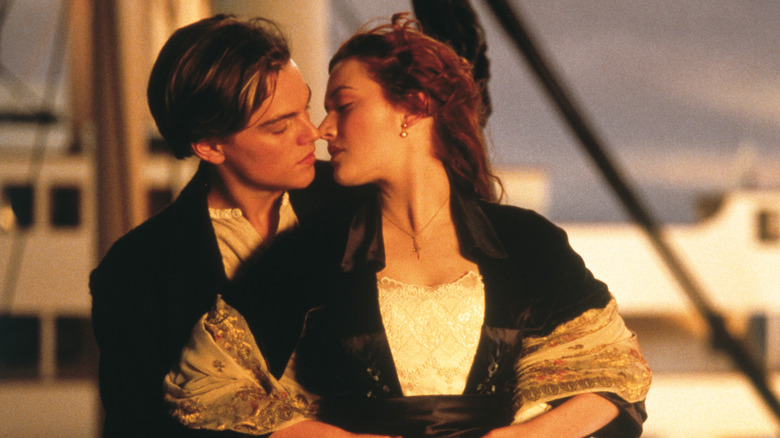The Tragic Real-Life Story Behind The Elderly Couple In Titanic
There's a certain sequence in James Cameron's sweeping romance "Titanic" about the famed maritime disaster that never fails to make me sob uncontrollably — choking, ugly sobs. On April 15, 1912, the "unsinkable" ship of dreams collided with an iceberg during its maiden voyage from Southampton to New York City. The majestic vessel did eventually sink, sadly taking over 1,500 lives. Cameron's depiction of the sinking is equally frighting and heart-wrenching.
As the ship gradually starts to fill with water, the Titanic band plays a cheery tune to fruitlessly lift passenger's spirits while they desperately search for a lifeboat — but there is not enough room for every passenger. After the band ends their tune and bids farewell, the violinist begins to play the mournful hymn "Nearer My God to Thee." A devastating montage of various passengers accepting their grim fates overlays this somber song.
Captain Smith watches the water rise outside of his wheelhouse, preparing for the icy blast to devour him; the ship's architect, Thomas Andrews, corrects the time on a clock — a sad image of the meticulous care he put into crafting such a gorgeous ship doomed to lie on the ocean floor for eternity; an Irish immigrant mother tells a final bedtime story to her children; and finally, an elderly couple hold each other in bed, the husband giving his wife a kiss on the cheek as the freezing water rushes in beneath them.
Cameron really knows how to tug on the audiences' heartstrings. It's agonizing to see these humans in their final moments, especially with their loved ones. Did you know that the elderly couple featured in the montage were not an invention, like the titular characters of Jack and Rose, but based on actual people?
They were based on Isidor and Ida Straus
The older couple was based on Isidor and Ida Straus, first-class passengers who chose to die together on the ship. Isidor was the co-owner of Macy's department store and a former U.S. Congress member. The Straus' great-grandson Paul A. Kurzman shared their tragically romantic story with TODAY, explaining how his grandmother Ida chose to make a huge sacrifice for her husband of 40 years.
"My great-grandmother Ida stepped into the lifeboat expecting that her husband would follow. When he didn't follow, she was very concerned and the ship's officer in charge of lowering that particular lifeboat said, 'Well, Mr. Straus, you're an elderly man, and we all know who you are. Of course you can enter the lifeboat with your wife. And, my great-grandfather said, 'No. Until I see that every woman and child on board this ship is in a lifeboat, I will not enter into a lifeboat myself.'"
But Ida would not leave her husband's side, stepping out of the lifeboat and telling him, "Where you go, I go" (via National Archives). Ida's devotion to her spouse was more important than her escape; she cared more about being with him than making it out alive. This touching exchange is shown in one of the "Titanic" film's deleted scenes. After deciding to stay on the sinking ship, Ida gave her maid, Ellen Bird, a fur coat and insisted she get on a lifeboat. When Bird tried to return the coat to their daughter Sara, she said, "This coat is yours. I want you to keep it in memory of my mother."
According to the National Archives, the couple was last seen on deck, holding hands. Then, "a wave swept them both into the sea." They didn't die in their stateroom as portrayed in "Titanic." Isidor's body was recovered and buried in the Bronx's Woodlawn Cemetery, but not Ida's; the family collected water from the wreck site and placed it in an urn beside Isidor in the mausoleum which has a quote from the Song of Solomon inscribed: "Many waters cannot quench love — neither can the floods drown it."
Isidor and Ida mirror who Jack and Rose would have been if they had the chance to grow old together. James Cameron's gutting image of the elderly couple clutching one another in solace while bracing a bitter, terrifying death honors the real-life Straus couple and their enduring love. Even as they were about to meet their death, they took comfort in the fact that they still had each other. It's moving moments like these that makes "Titanic" a remarkable epic that represents the victims of this tragic disaster with great empathy.

